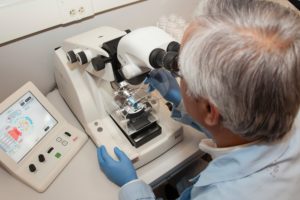
The quest for fertility often encounters enigmatic challenges. Among these, low sperm count stands as a formidable adversary to the dreams of parenthood.
Lifestyle factors and environmental influences have been explored in the context of male fertility, but the role of genetics remains a lesser-understood piece of the puzzle.
What are the genetic factors and how to define their influence on low sperm count and overall male reproductive health?
Genetic Factors and the Enigma of Low Sperm Count
- The Mysterious World of Spermatogenesis: At the heart of male fertility lies spermatogenesis, a miraculous biological process through which the male body crafts the sperm cells essential for reproduction. This intricate dance of cell division and differentiation is choreographed by a symphony of genes, and any discord in this symphony can lead to reduced sperm production, known as low sperm count or oligospermia.
- A Genetic Influence on Fertility: It is well-established that genetics plays a pivotal role in the makeup of an individual, influencing everything from eye color to susceptibility to certain diseases. Similarly, genetic factors can significantly affect male fertility, impacting not only sperm count but also sperm motility and morphology.
- A Multifaceted Exploration: By understanding the genetic underpinnings of infertility, individuals and couples can gain valuable insights into their reproductive health and make informed decisions.
- Navigating the Genetic Landscape: From chromosomal variations to gene mutations and genetic syndromes, each facet offers a unique perspective on the challenges of low sperm count.
Genetic Causes of Low Sperm Count
Within the human genome lies the blueprint of life, a complex code that orchestrates the development and function of every cell, including the specialized cells responsible for reproduction—sperm. When disruptions occur in this intricate genetic script, it can lead to a condition known as low sperm count, sending ripples through the journey to parenthood.
Chromosomal Abnormalities
One of the primary genetic factors contributing to low sperm count is chromosomal abnormalities. These alterations in the number or structure of chromosomes can disrupt the balance of genes crucial for spermatogenesis. For example, Klinefelter syndrome, a chromosomal condition where an extra X chromosome is present (XXY), is known to significantly reduce sperm production. Men with Klinefelter syndrome often face challenges related to low sperm count and impaired fertility.
Y-Chromosome Deletions
Specific genetic variations can be pinpointed as culprits in the quest for a definitive diagnosis. Y-chromosome’s deletions, where a portion of the Y chromosome is missing, are particularly relevant. The Y chromosome carries genes responsible for sperm development, and deletions in these regions can result in low sperm count. Genetic testing is a valuable tool for identifying these deletions and understanding their impact on fertility.
Numerical Chromosome Abnormalities
Beyond specific syndromes, numerical chromosome abnormalities can affect sperm production. Conditions like Down syndrome (trisomy 21) and Edwards syndrome (trisomy 18) involve an extra chromosome, often leading to not only systemic health issues but also potential disruptions in spermatogenesis. These numerical abnormalities can result in low sperm count and complicate the journey to conception.
Genetic Testing and Counseling
Genetic testing and counseling play pivotal roles in diagnosis and decision-making. For individuals and couples experiencing fertility challenges, genetic testing can offer insights into the underlying genetic factors at play. Genetic counselors provide guidance on interpreting test results, exploring treatment options, and making informed choices on family planning.
The genetic causes of low sperm count weave a complex web of variables, from chromosomal abnormalities to specific gene mutations. Understanding these genetic underpinnings empowers individuals and couples on their fertility journey. It provides a roadmap for genetic testing, family planning decisions, and potential treatment options tailored to the specific genetic factors at play.
Source: Genetic Conditions Determining Male Infertility
Chromosomal Abnormalities and Sperm Count
Within the symphony of genetic orchestration, chromosomal abnormalities often play a dissonant role in the delicate process of spermatogenesis, giving rise to low sperm count. These genetic variations, sometimes subtle and sometimes profound, can significantly impact a man’s ability to produce an adequate number of healthy sperm.
Understanding Chromosomal Abnormalities
Chromosomes are the carriers of our genetic information, and any deviations in their number or structure can have profound consequences. In the context of low sperm count, chromosomal abnormalities are particularly relevant. One of the most well-known conditions associated with low sperm count is Klinefelter syndrome.
Klinefelter Syndrome
Klinefelter syndrome occurs when there is an extra X chromosome (XXY) in addition to the typical male XY configuration. This genetic anomaly disrupts the delicate balance of genes responsible for spermatogenesis.
Men with Klinefelter syndrome often face challenges related to low sperm count, as well as issues with sperm motility and morphology. The presence of extra genetic material can result in disruptions to the normal development and function of sperm.
Source: Klinefelter syndrome
Structural Chromosomal Abnormalities
Beyond numerical variations, structural chromosomal abnormalities can also affect sperm count. These abnormalities involve alterations in the structure of chromosomes, such as translocations or inversions. These structural changes can interfere with the proper segregation of genetic material during meiosis, the cell division process that gives rise to sperm. Consequently, this can lead to a reduced quantity of sperm being produced.
Genetic Testing and Counseling
The diagnosis of chromosomal abnormalities as a cause of low sperm count often requires genetic testing. Genetic tests, such as karyotyping, can reveal these chromosomal variations. Genetic counselors play a crucial role in interpreting these test results and providing guidance to individuals and couples. They can discuss the implications of the diagnosis, explore fertility treatment options, and offer insights into family planning.
While chromosomal abnormalities present unique challenges to fertility, knowledge is a beacon of hope. Understanding the genetic underpinnings of low sperm count due to chromosomal abnormalities enables individuals and couples to make informed decisions about their reproductive journey. It also opens doors to assisted reproductive technologies, such as in vitro fertilization (IVF) with intracytoplasmic sperm injection (ICSI), which can overcome some of the barriers imposed by these genetic variations.
Source: Chromosomal disorders and male infertility
Gene Mutations and Male Infertility
In the world of genetics, gene mutations can be both the architects of life and the architects of disruption. When it comes to male fertility, certain gene mutations can act as significant disruptors, leading to low sperm count and challenges in the quest for parenthood.
The Role of Genes in Spermatogenesis
Genes are the instruction manuals that govern the development and function of all cells, including the specialized cells responsible for sperm production. Mutations in these genes can disrupt the finely tuned processes of spermatogenesis—the creation of healthy, functional sperm.
Genes Associated with Spermatogenesis
Numerous genes are involved in the regulation of spermatogenesis. Mutations in these genes can lead to reduced sperm production, impaired sperm motility, and morphological abnormalities. For example, mutations in genes like CFTR (cystic fibrosis transmembrane conductance regulator) and CATSPER1 (cation channel sperm-associated protein 1) have been linked to low sperm count and reduced fertility.
Non-Obstructive Azoospermia (NOA)
Non-obstructive azoospermia is a condition characterized by the absence of sperm in ejaculate due to disrupted spermatogenesis. Gene mutations can play a pivotal role in the development of NOA. For instance, mutations in genes associated with the proper functioning of the testes and sperm production can lead to this condition.
Understanding Gene Mutations
Genetic testing plays a critical role in identifying gene mutations that contribute to male infertility. These tests can pinpoint specific genetic variations that may be responsible for low sperm count. Genetic counselors work in tandem with individuals and couples to interpret these test results, providing insights into the genetic factors affecting fertility and potential courses of action.
Family Planning Decisions
Armed with knowledge about gene mutations and their implications for fertility, individuals and couples can make informed decisions about family planning. They can explore options such as assisted reproductive technologies (ART), donor sperm, or adoption to achieve their dreams of parenthood.
Ongoing research in the field of genetics and male infertility continues to uncover new gene mutations associated with low sperm count. This research not only expands our understanding of the complex genetic factors at play but also offers hope for potential therapies in the future.
Source: Defining new genetic etiologies of male infertility
Genetic Syndromes and Reproductive Health
Beyond individual gene mutations, certain genetic syndromes cast a broader shadow over reproductive health, impacting not only fertility but also overall well-being. Understanding these syndromes and their implications for sperm count is essential for individuals and couples navigating the intricate world of male infertility.
- Cystic Fibrosis (CF): Cystic fibrosis is a genetic disorder caused by mutations in the CFTR gene. While CF primarily affects the respiratory and digestive systems, it can also have significant implications for reproductive health. In men with CF, congenital bilateral absence of the vas deferens (CBAVD) is a common condition. CBAVD leads to the absence of the vas deferens, which is the duct that carries sperm from the testes to the urethra. As a result, sperm may not reach ejaculate, leading to low sperm count or azoospermia (absence of sperm).
- Congenital Adrenal Hyperplasia (CAH): Congenital adrenal hyperplasia is an inherited condition that affects the adrenal glands and can lead to hormonal imbalances. In some cases, CAH can result in excess production of androgens (male sex hormones) in females and males. Excess androgens in males can disrupt normal testicular development and spermatogenesis, potentially leading to low sperm count.
- Androgen Receptor Mutations: Androgen Receptor Mutations represent a subset of genetic factors that can affect male fertility. These mutations can lead to Androgen Insensitivity Syndrome (AIS), a condition where individuals with male genetic makeup (XY) have reduced responsiveness to male sex hormones (androgens). AIS can result in a range of phenotypes, from complete androgen insensitivity to partial insensitivity. In some cases, individuals with AIS may have low sperm counts or azoospermia due to disrupted androgen signaling pathways.
- Kallmann Syndrome: Kallmann syndrome is characterized by the impaired production of gonadotropin-releasing hormone (GnRH), a hormone that regulates the release of other hormones involved in reproduction. This syndrome can lead to delayed or absent puberty and, in some cases, low sperm count due to disrupted hormonal signaling.
- Turner Syndrome: Turner syndrome affects females and is caused by a missing or partially deleted X chromosome. While it primarily affects females, males with Turner syndrome (often mosaic Turner syndrome) can experience reproductive challenges, including low sperm count or azoospermia.
- Neurofibromatosis: Neurofibromatosis type 1 (NF1) is a genetic disorder that can cause the development of benign tumors in various parts of the body, including the reproductive system. In some cases, these tumors can impact sperm production or function.
Individuals with these genetic syndromes often require specialized medical care and genetic counseling. Management may include assisted reproductive technologies, such as in vitro fertilization (IVF) with sperm retrieval, to overcome fertility challenges. Genetic counseling is instrumental in helping individuals and couples make informed decisions about family planning and addressing the potential genetic risks to offspring.
Source: What is Genetic Counseling?
Conclusion: Navigating the Genetic Landscape of Male Infertility
In our quest to unravel the mysteries of male infertility, we have embarked on a profound journey through the intricate terrain of genetics—a realm where life’s blueprint is both beautifully intricate and occasionally marred. The spotlight has been cast on genetic factors and their profound influence on low sperm count, a condition that can challenge the dreams of parenthood.
- From chromosomal abnormalities like Klinefelter syndrome to gene mutations disrupting spermatogenesis and genetic syndromes impacting reproductive health, each factor has woven a unique thread into the tapestry of male fertility.
- The role of genetic testing and counseling cannot be overstated. These tools empower individuals and couples to explore their genetic landscape, gaining insights into potential obstacles to conception.
- While genetic factors may pose challenges, they also represent opportunities for overcoming fertility barriers. Assisted reproductive technologies, such as intracytoplasmic sperm injection (ICSI) and sperm retrieval, offer hope to those with genetic-related low sperm count. Ongoing research into the genetics of male infertility continues to uncover new insights and potential therapeutic approaches, holding the promise of brighter tomorrows for those facing genetic fertility challenges.
Despite the complexities posed by genetics, individuals and couples persist in their pursuit of the dream to build a family. They are supported by the knowledge that, even in the face of genetic factors, there are pathways forward, and hope remains a steadfast companion.


